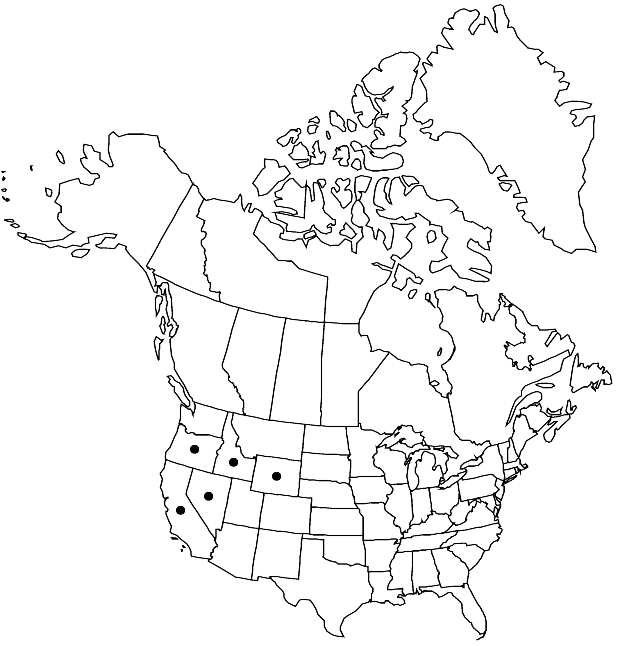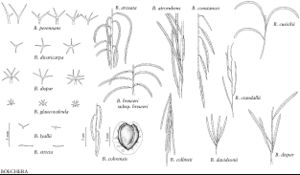Boechera cobrensis
Vasc. Pl. Wyoming ed. 3, 375. 2001.
Perennials; long-lived; (often cespitose); sexual; caudex somewhat woody (usually without persistent leaf bases). Stems usually 1 per caudex branch, arising from center of rosette near ground surface, (1.2–)2.5–6 dm, densely pubescent proximally, trichomes short-stalked, 4–10-rayed, 0.1–0.2 mm, sparsely pubescent or glabrous distally. Basal leaves: blade linear to narrowly oblanceolate, 1–4 mm wide, margins entire, ciliate near petiole base, trichomes (simple), to 0.6 mm, surfaces densely pubescent, trichomes short-stalked, 4–10-rayed, 0.1–0.2 mm. Cauline leaves: 5–10, not concealing stem; blade auricles 1–1.5 mm, surfaces of distalmost leaves usually sparsely pubescent. Racemes 10–25-flowered, often sparingly branched. Fruiting pedicels divaricate-ascending to horizontal, often straight proximally, usually strongly recurved or reflexed distally, 4–17 mm, usually pubescent, rarely glabrous, trichomes appressed, branched. Flowers divaricate-ascending at anthesis; sepals pubescent; petals white to lavender, 3.5–6 × 0.7–1 mm, glabrous; pollen ellipsoid. Fruits pendent, not appressed to rachis, not secund, straight or slightly curved, edges parallel, 2.5–5.5 cm × 1.7–2.5 mm; valves glabrous; ovules 34–64 per ovary; style 0.05–0.2 mm. Seeds uniseriate, 1.4–1.8 × 1–1.2 mm; wing continuous, 0.25–0.5 mm wide. 2n = 14.
Phenology: Flowering May–Jun.
Habitat: Sandy soil, usually under shelter of shrubs in semi-desert communities
Elevation: 1200-2800 m
Distribution

Calif., Idaho, Nev., Oreg., Wyo.
Discussion
Boechera cobrensis is a sexual diploid commonly found on stabilized sand dunes. The related B. lignifera often is found in similar habitats, and the two species can be difficult to distinguish where their ranges overlap in Idaho and Wyoming. It is possible that B. cobrensis was involved in the origin of some apomictic populations currently assigned to B. lignifera.
Selected References
None.
